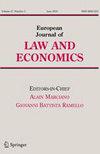有组织犯罪是不平等和腐败之间的纽带
IF 1.1
3区 社会学
Q3 ECONOMICS
引用次数: 1
摘要
我们研究了一个模型,该模型为实证充分证明的不平等与腐败之间的关系建立了一个新的理论基础。根据我们的模型,不平等会助长有组织犯罪,从而滋生腐败,因为在高度不平等或安全部队薄弱的社会中,地方警察部队和犯罪组织之间的勾结更有可能发生。由于专业化带来的效率收益,执法部门和有组织犯罪有很强的勾结动机。然而,当暴徒们不能再可信地承诺共同租金最大化,从而开始与执法部门争夺公民的财富时,他们的协议就破裂了。然后,暴徒们通过削弱警察力量,以非暴力方式垄断市场,进行敲诈勒索,类似于掠夺性定价策略。因此,犯罪勾结与企业勾结并没有太大区别;因此,类似的政策措施应该很有希望。此外,我们的模型还表明,当执法部门和有组织犯罪之间的相对权力相当平衡时,犯罪组织在提取租金方面的效率更高,影响更大。因此,当暴力冲突变得难以预测时,相对力量的非暴力因素就变得更为重要。我们的模型还允许这样一种解释,即在缺乏强有力的社会反腐败规范的情况下,有组织犯罪更难以挑战。本文章由计算机程序翻译,如有差异,请以英文原文为准。

Organized crime as a link between inequality and corruption
Abstract We study a model that establishes a novel theoretical rationale for the empirically well-documented relation between inequality and corruption. According to our model, inequality can nurture corruption by empowering organized crime because collusion between local police forces and criminal organizations is more likely in societies characterized by high inequality or weak security forces. Law enforcement and organized crime have a strong incentive to collude due to efficiency gains from specialization. However, their agreement breaks down when the mobsters can no longer credibly commit to joint rent maximization and thus start to compete with law enforcement for citizens’ wealth. The mobsters then non-violently monopolize the market for extortion by undercutting the police forces, similar to a strategy of predatory pricing. Criminal collusion is thus not very different from its corporate equivalent; hence, similar policy measures should be promising. In addition, our model also suggests that the criminal organization’s higher efficiency in extracting rents has a greater impact when the relative power between law enforcement and organized crime is rather balanced. Accordingly, when violent conflict becomes less predictable, non-violent elements of relative power become more relevant. Our model also allows for the interpretation that in the absence of strong social norms against corruption, organized crime is more difficult to challenge.
求助全文
通过发布文献求助,成功后即可免费获取论文全文。
去求助
来源期刊

European Journal of Law and Economics
Multiple-
CiteScore
2.40
自引率
7.70%
发文量
37
期刊介绍:
The European Journal of Law and Economics provides readers with high-quality theoretical and empirical research in which both the legal and economic dimensions merge and combine. The journal welcomes articles that promote a better understanding of legal phenomena, legal decisions made by judges, courts or regulatory agencies, and involving economic tools. Theoretical papers are welcome, provided they have a strong basis in law and economics. We also welcome case studies, as well as empirical analyses – including empirical legal studies – and experimental investigations. The European Journal of Law and Economics does not favor any particular topic, but does have a focus on new and emerging problems. European themes are particularly welcome, because we feel it is important to exploit Europe’s considerable institutional diversity in order to build a more robust body of theory and empirical evidence. However, the purpose of the journal is also to showcase the diversity of law and economics approaches, as supplied by an international mix of authors. Drawing on the support of respected scholars from around the world, who serve as consulting editors and editorial board members, the Editors wish to give contributing authors the opportunity to improve their papers, while also offering them a quick and efficient review process.
Officially cited as: Eur J Law Econ
 求助内容:
求助内容: 应助结果提醒方式:
应助结果提醒方式:


